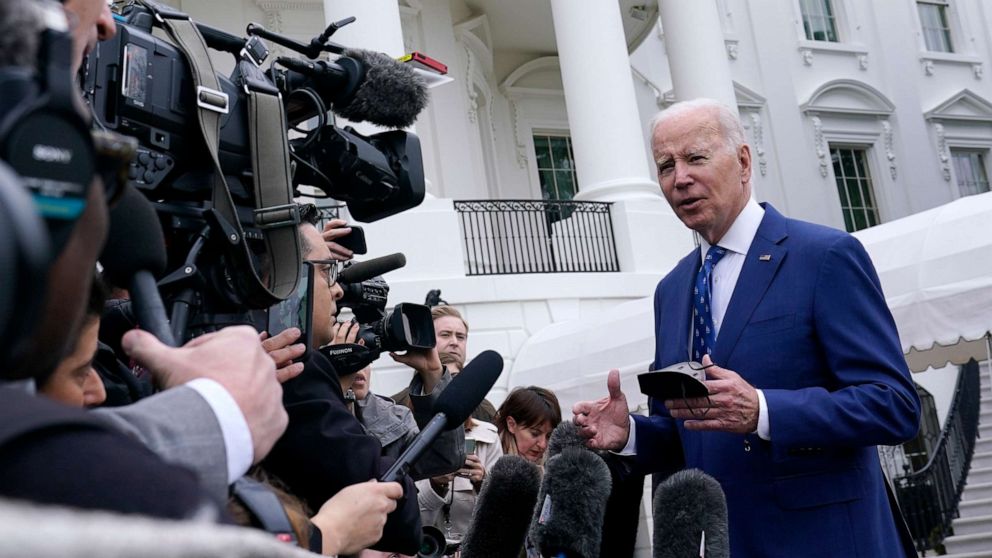President Joe Biden on Thursday said he plans to visit the southern border with Mexico on Sunday, for the first time since taking office.
Biden said he will visit El Paso, Texas, “to assess border enforcement operations, meet with the local officials and community leaders and the folks at the border sending me what they need that they don’t have.”
Since he became president, Republicans have hammered Biden on his handling of immigration and the
” target=”_blank”>persistent migrant crisis at the southern border, making it a top campaign issue in last year’s midterm elections.
Despite that pressure, Biden has resisted their calls for him to actually visit the border.
Venezuelan migrants crowd around an outdoor bonfire as temperatures plummet along the Mexican-U.S. border, Dec. 22, 2022, in Ciudad Juárez, Mexico.
Morgan Lee/AP
But on Thursday, Biden accused Republicans of not having been “serious about this at all.” And he said that after he gets feedback from officials on the border, he would “make it public” what those officials say “they need, they don’t have — to try to convince my Republican colleagues they should do something.”
Biden had already planned to visit Mexico City on Monday and Tuesday to meet with Mexican President Andrés Manuel López Obrador and Canadian Prime Minister Justin Trudeau. That so-called “North American Leaders Summit,” also known as the “Three Amigos Summit,” will focus on climate change, migration, the environment, the economy and other topics, the White House has said.
The Biden administration also announced Thursday it planned to send more migrants back to Mexico, even as it fights in court to end the “Title 42” pandemic-era restrictions the federal government is currently enforcing. Working with the Mexican government, the administration expects to send as many as 30,000 unauthorized Cuban, Haitian, Nicaraguan and Venezuelan migrants to Mexico each month.
While not an official expansion of Title 42 — given that there have never been nationality-based exceptions to the protocols – Mexico’s acceptance of Cubans, Haitians and Nicaraguans will effectively allow for more Title 42 expulsions while the order remains in place. Diplomatic tensions have caused difficulties in organizing removal flights to those countries. Mexico’s agreement to accept them will allow for more removals under Title 42 or by other means.


President Joe Biden talks with reporters outside of the White House, Jan. 4, 2023, in Washington.
Susan Walsh/AP
Simultaneously, the president on Thursday announced a new policy expansion that will admit up to 30,000 migrants per month from Cuba, Haiti, Nicaragua and Venezuela. Venezuelans had already been able to apply for admission as part of the parole program which allows migrants to seek asylum.
The migrants must meet certain sponsorship criteria and who pass background checks and additional vetting, according to the Biden administration.
“My message is this,” he said. “If you’re trying to leave Cuba, Nicaragua, or Haiti, you have – and we have — and have agreed to begin a journey to America, do not, do not just show up at the border. Stay where you are and apply legally from there. Starting today if you don’t apply through the legal process you will not be eligible for this new parole program.”
The administration also plans to expand expedited removal processes which could result in non-Mexicans getting sent to Mexico even without Title 42, officials said Thursday.
Expedited removal under Title 8 of the U.S. code is separate from Title 42 and has been part of the standard method for handling unauthorized migration across administrations. Title 8 also allows authorities to apply legal consequences for illegal crossings, including a 5-year ban on reentry into the U.S.
House Republican Leader Kevin McCarthy, R-Calif., speaks after a closed-door meeting with the GOP Conference, Jan. 3, 2023, in Washington.
Alex Brandon/AP
Biden’s focus on the border came on a day when the GOP was distracted by a leadership battle in the House of Representatives, where Rep. Kevin McCarthy struggled to fend off a rebellion by staunch conservatives.
That fight for speaker of the House had muted what might have been a stronger response from congressional Republicans, who in the past have slammed Biden for what they say is a lack of attention to border security.
Biden called on Republicans to work with him — and to provide more funding to tackle the crisis.
“Our problems at the border didn’t arise overnight and they’re not going to be solved overnight,” the president said. “It’s a difficult problem. It’s clear that immigration is a political issue that extreme Republicans are always going to run on. But now they have a choice. They can keep using immigration to try to score political points or they can help solve the problem.”
